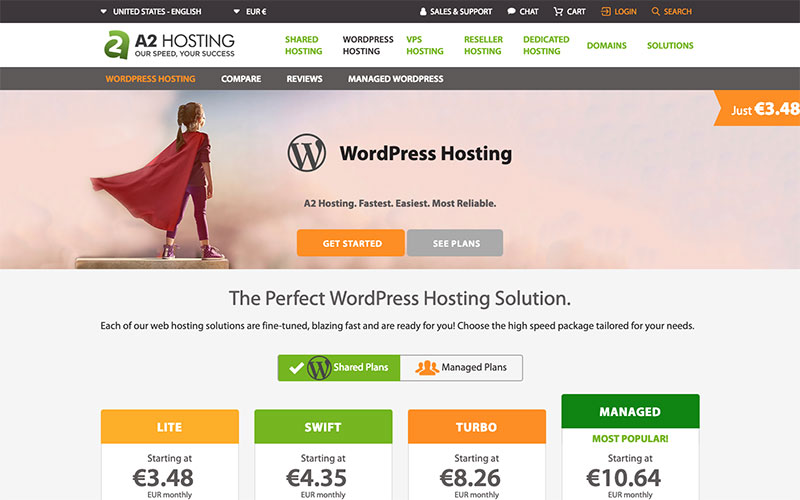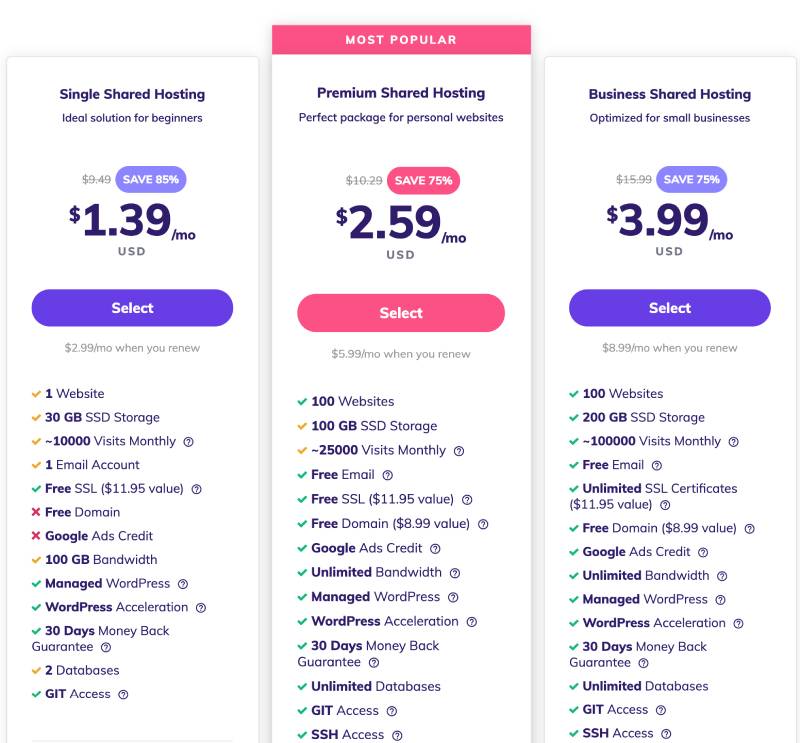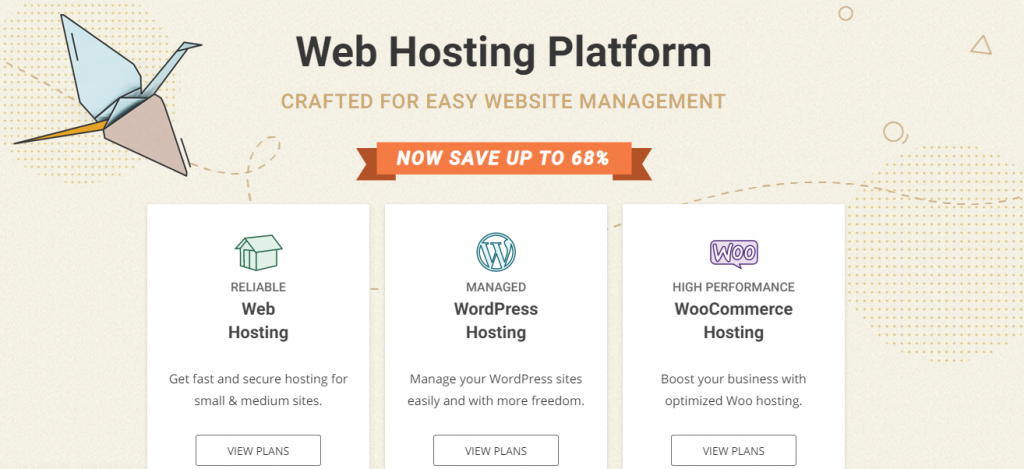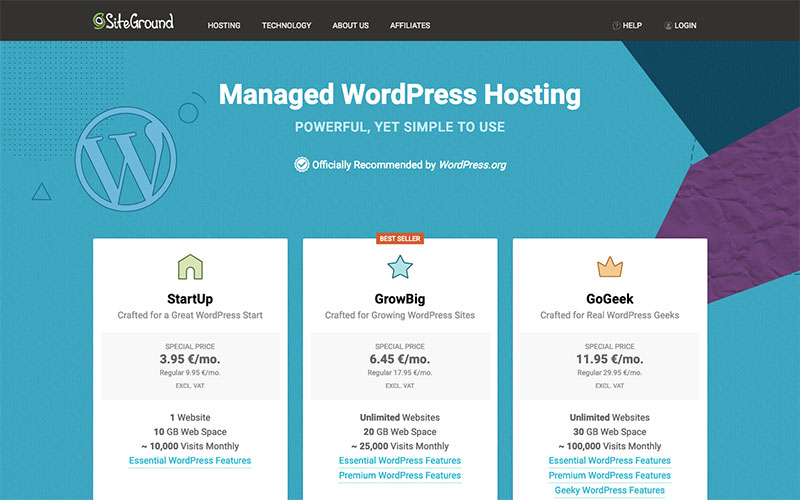Table of Contents
Let’s have a look at some of the best business hosting options available on the market. In order to keep my evaluations relevant and useful, I will dive deeper into 3 products and will place a special emphasis on characteristics that are vital to small business owners.
Methodology
Initially, we conducted research and testing with upwards of 40 different providers in order to determine the finest web hosting for small companies. Our selection criteria include not just what is most necessary for any hosting provider to supply but also what is most crucial for a small business to supply as well.
The features that small companies require are at the top of our list of criteria and include things like free backups, ample storage, and 24-hour support. Small company owners should concentrate on developing their companies rather than on manual tasks such as backing up their websites or searching through knowledge bases for a solution to an issue. We also looked at the cost offered by each website hosting business, as well as if you might save more money by signing a long-term agreement.
Customer feedback should be taken into consideration at all times. We looked at what users had to say about every provider and whether or not you would be able to obtain the assistance you require. Small companies should also select a web host that will allow them to expand as their needs increase, which is why we gave higher ratings to web servers that provide VPS or dedicated servers.
What are Website Hosting Services and Which is Right for You?
Website hosting services are, in essence, the plot of online real estate on which your website shop is constructed. There are many various sorts of hosting services, such as GoDaddy, that address the needs of different types of enterprises and organizations. You will select a hosting provider based on the variables discussed below, which may vary depending on the business style and size.
How to Select the Most Appropriate Web Hosting Company?
A tool such as Hostgator Domain Name search will allow you to find out which domain names are available to buy before you can begin the process of setting up your website and selecting a web hosting business. As soon as it is completed, it is necessary to consider the following factors when selecting a hosting provider:
Bandwidth
In order to accommodate big quantities of graphics, hundreds of pages, and high levels of traffic, you’ll need a lot of bandwidth and storage space. There are unlimited options available, and these make your business life a lot simpler.
Compatibility
Check to see if the website hosting service is consistent with the operating system(s) that you’re using on your computer.
Reliability
The top web hosting providers have availability rates between 98 and 99 percent, which is commonly referred to as “Uptime” in the industry. It’s simple to make such promises, though, so make careful to check to see whether they follow through on their promises..
Security
Making a decision on a web hosting company without first researching the security features that are provided is a major error. Firewalls, regular backups, and authentication mechanisms are all examples of features that should be incorporated. It’s also convenient to receive notifications anytime changes are made since they might alert you to any questionable behavior that might be taking place.
How to Choose the Best Web Hosting Company?
- Creating an online presence
Any business, no matter how little or large, must have a digital presence in form of a webpage or a social media profile to be successful. If some of these factors are missing, the presence of your company may not be taken into consideration by their customers. Having a website may assist businesses in improving the impression that the general public has of their company and its products. - Identifying and attracting local customers
As a result, if you are trying to push your company to the top of search engine results for even the most basic of searches, you may find yourself with some additional business if you put some effort into developing strategies to rank your key phrases through the use of an SEO. Additionally, your website may be beneficial for increasing brand recognition among members of the local community, in addition to connecting out to your existing consumers. - Customers’ contact information is shared with them
People in your immediate vicinity are aware that your company exists, but they are unsure of how to contact you. The ideal situation would be for your website to provide the whole location of your business as well as a clear description of how to contact you. It is also critical to provide other contact information, such as your business phone number and email address. - Assists in the receipt of online inquiries
Many smaller companies prefer to handle their client inquiries online rather than via phone, and this is especially true for those in the service industry. It is also more time efficient because you may respond to emails at your convenience and address a big number of individuals at the same time via your online presence. Incorporating a contact form on your website may also be a wonderful method for your consumers to get in touch with you without having to leave your site entirely. Some small companies even opt to use live chats to assist their consumers in resolving their issues. - Online content contributes to the development of one’s reputation
Content marketing is used by a big number of successful business owners to keep their customers and employees informed about their products and services . For a longer length of time, your company can serve as an excellent platform for distributing your material. Your blog entries on your website are beneficial to your customers. Content marketing establishes you as an expert in your field while also assisting in the development of positive relationships with your customers. - Getting to Know Your Customers
The usage of websites should not be limited to the purpose of sharing information about your company with the rest of the world. Using your website to understand more about your clients and then using that knowledge to drive additional sales and conversions is another option you have available to you. You may use surveys on your webpages to find out what your consumers are interested in learning about. You may use a variety of online tools to create surveys, and you can also watch the metrics of your website in order to gather vast amounts of information about the activity of your website’s users. - Providing Employees with Personalized Email Addresses
Once you have acquired a domain name for your company, you can utilize the domain to create customized email accounts for your workers using the domain name. This is quite beneficial since an email address that has a domain appears more professional. Having a customized email address provides the impression to your customers that you are serious about operating a successful business. - Increasing Online Revenue
Aside from facilitating business growth, your website may also serve as a new sales channel, allowing you to conduct online transactions. Creating an online store and integrating it with your existing business website is simple and straightforward. This might assist you in generating revenue even after normal business hours have ended for the day. - Making Use of Email Marketing
With email marketing becoming increasingly popular, it has surfaced as among the most efficient methods for staying in touch with consumers as well as generating sales and getting conversions. People may join up for your email list through your website, which can be a great way to increase your sales. Having established an audience, you may send as many emails to that group of people as you wish at your discretion. - Creating an Online Community
You may create an online network with your visitors if you have a company website, which is one of the most significant advantages of having one. This may be utilized as a digital platform where individuals (visitors) can interact with one another and “speak and share” their expertise. It is possible to include a place for comments on your website’s blog, allowing your visitors to ask questions about your business and also critique your postings with one another. You may even build up an online community or even a public chat room to discuss your ideas. Setting up an online forum encourages your visitors to spend more time on your website and to return more frequently.
What Features to Look For in A Hosting Service?
The scope of available resources
Many people still believe that a limitless supply of critical commodities will be too expensive. In reality, there are a large number of web companies capable of supplying such a large amount of data at very reasonable prices. It is possible to have an infinite amount of bandwidth, websites, storage, and email accounts even with shared hosting services. So bear in mind to choose a service provider that can offer an appropriate quantity of resources while without compromising the client’s financial resources.
The speed at which the site is loaded
According to a Google statement from a few years back, even just a two-second delay might lead potential consumers to abandon your website. The attention span of the average person nowadays is quite short. Online surfers, particularly on the net, where everything unfolds at the speed of light, anticipate each page to load in a matter of microseconds.
As a result, the hosting provider of your choice must be capable of providing rapid page loading. On their websites, several service providers give an actual estimate of the typical loading time. Look for this type of information on their official website as well as other reputable sources.
The percentage of time that the system is up and running
Even though your website pages load in the shortest amount of time, it is of little use if prospective clients are unable to access the site. It is necessary for a website to have an uptime of at least 99.94 percent on average in a day and age. As a result, any web server that promises an uptime % that is lower than that is not worth consideration.
Some web providers even guarantee to pay customers if their website is ever offline for a longer period of time than they anticipated. Choose a supplier who is confident in their abilities and whose connectivity historical record for other clients is consistent with their claims of reliability.
Site Migration
For those who have done this before, you will want a web host that does not charge an additional fee for transferring your site from your former service supplier to the current one. Most hosting companies include this benefit as part of their hosting packages. Moving a website from one server to another is a time-consuming and complicated operation in and of itself. Accepting the disadvantage of having to pay an additional fee for the relocation may just add to the difficulty.
Backups are performed on a regular basis
The hosting services provide data backups on a weekly or daily basis, depending on the pricing point that has been established. For the more cheap options, they may put a limit on the number of backups that may be made in a day or a time limit on how long it takes to provide the backups. It could also be either automated or manually operated. The most convenient option is to have daily automatic backups performed.
Customer Service
Any hosting business that provides proactive and competent customer assistance will succeed. There is a good chance that no matter what sort of business you are operating, it will at some point become the victim of a crash or other trouble. If the support staff does not reply to your request for the assistance within a reasonable amount of time, your company will suffer significant financial damages. Additionally, even if the team responds immediately but fails to deliver the needed remedy, the situation is still problematic. As a result, check for customer assistance that is available 24 hours a day, seven days a week, and whether the support personnel has received any type of training previously.
Security Measures
A free HTTPS protocol is the most fundamental standard security precaution for a hosted website, and it is the most often used. Additionally, your selected web host must provide scanning of the network and servers in addition to this essential functionality. It should also delete any malware that has been discovered and safeguard the site against cyber-attacks. A PCI-compliant e-commerce website is required to ensure the security of financial transactions on the site.
Developer-Friendly Software
Locate a web hosting provider that is compatible with the most widely used programming languages and operating systems if your website demands a developer-friendly environment. The most frequent characteristics of this type of hosting service support for numerous PHP versions up to and including the most recent 7.2 release, Node.js, Perl, Python, Apache, and MySQL. You should consider including any or all of these as beneficial add-ons to your site hosting plan, and the engineers on your staff will be quite thankful for the opportunity.
Support for CMS
Support for a content management system, often known as a CMS, is essential for e-commerce websites. Despite the fact that WordPress is the most popular content management system, you may choose from a variety of specialized platforms like Magento, Joomla, Drupal, and PrestaShop, among others. These systems automate numerous time-consuming tasks and allow you to manage your website more effectively than you could previously.
Types of Web Hosting
Despite the fact that they all perform the same thing, they don’t all do it in the same way. There are significant differences in the types of web hosting and servers that businesses offer, depending on your present usage and future traffic expectations—differences that will have an impact on the capacity of your site as well as the prices you pay.
Shared web hosting
What is shared web hosting and how does it work? You’ll be sharing data centers with other customers of the web hosting service provider. You’re also splitting the expenses, this makes shared web hosting a more affordable alternative. However, there are certain disadvantages to using it as a first-time option for sites that do not expect a lot of traffic. If another website that shares the server receives a lot of traffic (or worse, is hacked), it may have an impact on your site’s performance and may even cause it to go down until the traffic levels return to normal. Alternatively, if your website creates higher traffic, you may be charged an additional fee.
Dedicated web hosting
While shared web hosting is less expensive, it is limited in terms of disk space and bandwidth. Dedicated web hosting, on the other hand, allocates a server to your company exclusively—and it is typically more expensive. However, if your site now gets considerable traffic or if you anticipate that it will in the future, the exchange would be worthwhile. It is possible that you will be responsible for your own maintenance if you choose dedicated hosting unless you switch to managed hosting.
Managed hosting
Managed web hosting businesses and dedicated web hosting firms perform very identical functions. The distinction is, with managed hosting, the business with whom you are working will take care of the upkeep and maintenance of your website for you. This hosting may well be worth the extra money if you don’t want to employ a professional expert to oversee the upkeep of your website.
VPS web hosting
Virtual private server (VPS) hosting is a type of hosting that falls somewhere in between shared hosting and dedicated hosting in terms of price and performance. VPS hosting replicates a dedicated server inside a segmented shared server, complete with its own software, disk, RAM, and data transfers, resulting in more reliable and protected site efficiency than traditional shared hosting. While virtual private servers (VPS) are still considered a kind of shared web hosting, they are more expensive—though they are generally half the price of dedicated hosting.
Cloud web hosting
Cloud hosting is a kind of virtual private server (VPS) hosting, or it may be the same thing depending on which company you speak with. Instead of depending on a central server, cloud hosting distributes the load of your website throughout a network of computers that operate together as a system. Due to the fact that the heavy lifting is distributed across a cloud server network, dependable uptime (as well as regional load-time speed) is enhanced, and more precautions against site assaults are put in place.
3 Best Web Hosting for Small Businesses
A2 Hosting
To start a website with A2 Hosting, you don’t need to know how to code or create web pages. You can just point and click. Several popular e-commerce software, including PrestaShop and Magento, are available from A2 Hosting and can be installed with a single click. This service is provided for free and is included with A2 hosting. A2 Hosting doesn’t have plans that are specifically designed for small businesses. Customers rely on their standard packages, which are supplemented by the option to install any third-party e-commerce program of their choosing.

The most affordable plan is Lite, which starts at a monthly cost of $ 3.92 and increases to a monthly cost of $ 7.99. It will only enable you to host one website with a maximum of five databases. Transfer and storage, on the other hand, are virtually limitless. Through Let’s Encrypt, you will be provided with a free SSL certificate. As a result, both your website and your clients will be protected. Through the user-friendly cPanel, you can keep track of the technical progress of your website. Install any application, such as Magento, PrestaShop, OpenCart, and so on.
The response times provided by A2 Hosting are significantly faster than those provided by competing providers. We tried several times and were able to get in touch with a service professional in much less than a minute after the first attempt.
When it comes to security, they provide a comprehensive set of features that are reasonable given their price range.
The usage of A2 Hosting firewalls is standard practice, but the servers rewind function is particularly beneficial since it serves as an enhanced backup. The best part is that this function is immediately available through your cPanel, which offers you the chance to utilize it to reclaim control of your website in the event that you are unable to access it directly from your browser.
Its exceptional performance, especially in the United States, and serious support are available at a cheap cost through A2 Hosting. It’s a fantastic all-around option that has a comprehensive set of security measures that are second to none. They don’t have a lot of options when it comes to plans, but their offerings are sufficient for medium and small internet businesses to operate successfully.
Key features
- Service Level Agreement (SLA) of 99.9 percent uptime
- There is a support staff accessible. 24/7/365
- Migration of accounts is completely free
- Servers that are up to 20 times faster
- Money-Back Guarantee is available at any moment.
Pros
- With seven copies of the website, this backup mechanism is quite strong.
- Advanced features, such as a server-side caching mechanism that is effective, are accessible with higher-tiered subscription levels.
Cons
- There are some unwelcome add-ons at the time of purchase.
- You must purchase their add-ons in order to use the on-demand backups.
Pricing

Hostinger
Hostinger is at the top of a list of the finest web hosts that provide special discounts to its customers. There are a variety of alternatives available at reasonable rates, which makes it the finest option available. Price reductions begin at only $0.99 per month for the first month. It provides both Windows and Linux hosting services.

Using Hostinger, you can choose from a variety of hosting packages, all of which are rated highly (5 stars). It is compatible with WordPress, cloud, VPS, and shared hosting environments. However, despite the low rates it gives, it has hundreds of capabilities at the lowest possible price. The shared plan with the lowest price includes 100GB of bandwidth, 10GB of storage, and an SSL certification.
The ultimate plans, which are the most comprehensive in terms of features, contain exceptional features like as over 100 personalized emails, free backup packages, limitless bandwidth, and over 100GB of storage space, among others.
Hostinger provides particular services for small businesses just getting started, however it does not offer dedicated hosting.
The cost ranges for Hostinger’s various plans vary depending on the plan selected.
It provides absolutely fantastic bargains with lower rates for the period of time between renewals. Above all, Hostinger provides a 30-day money-back guarantee with no questions asked.
Key features
- There are seven different types of hosting
- A vast amount of information
- Chat assistance is available 24/7/365.
- A website builder is a person who creates websites.
- A free SSL certificate and 100 GB of bandwidth are included with the lowest shared hosting package available.
- On the lowest shared hosting package, you get one email address.
- On premium subscriptions, you can get a free domain name.
Pros
- Live chat assistance is accessible in a variety of languages 24 hours a day, seven days a week.
- Prices that are reasonable and include a free SSL certificate with a 99.9 percent uptime guarantee
- Installer with a single click
- WordPress plans that are easy to use and have a strong onboarding process are excellent.
Cons
- 99.90 percent uptime is a low proportion of total uptime.
- It does not have a plan in place to ensure the long-term viability of the system.
- There is no customer service on the phone.
Pricing

Siteground
It is possible to rely on SiteGround’s specialized handcrafted hosting solution for small companies if you are seeking a website hosting platform for small businesses that are specifically designed for e-commerce apps. SiteGround not only installs Magento, Joomla, OpenCart, and a number of other open eCommerce platforms, but they also offer several server locations, unlimited CDNs, and extensive caching settings to enhance your digital commerce experience and that of your customers as quick and enjoyable as possible.

SiteGround also ensures that your company’s website is safer and more reliable than it would be if it were hosted anyplace else.
SiteGround provides specialized hosting for a number of popular e-commerce systems, including Magento and Shopify. When we tested SiteGround’s support service, we noticed that they were quite knowledgeable and willing to answer any queries we had through live chat. Aside from that, they provide a comprehensive range of security mechanisms that go above and beyond what one would anticipate given their inexpensive costs.
Key features
- Assistance with Site Transfer
- Registration of a domain name for a free WP eCommerce installation
- Servers that are optimized for WordPress eCommerce
- Free Content Delivery Network (CDN) Service
- Free daily backups, 24/7 phone and chat support, and several server locations are all included.
Pros
- There is a one-click setup as well as automatic updates available.
- Customer care that is kind and competent to aid with a smooth transition to a new web host.
Cons
- The billing cycle with the shortest length is 12 months.
- Low storage capacity at a high cost due to the premium price of the purchase.
Pricing

Final Thoughts
If you know what you want from your website, what your budget permits, and what sort of technology can help you get the most out of your website, you’ll be well on your way to finding the best web host for your needs. Up until this point, you’ll like to keep an eye on price, support, and add-on options — such as website builders and e-commerce solutions — to ensure that you choose the best decision for your business.
In addition, as we’ve seen, the majority of the best web design and hosting solutions for small businesses include 24/7 customer service, among other resources. In the event that you’re having difficulty selecting which platform is the greatest fit for your requirements, you can speak with a variety of customer service professionals to discover more about their products and how they could or might not function for your company.
